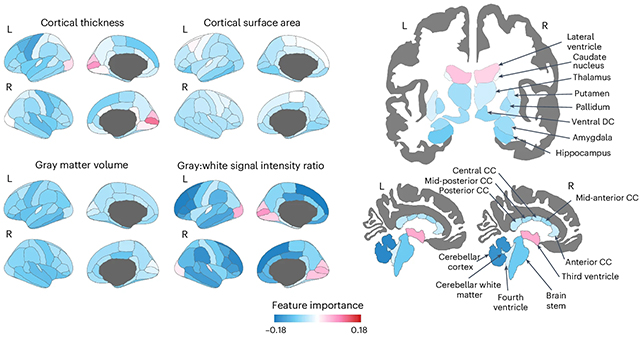The rate at which our bodies age and wear down doesn’t necessarily match our actual age, and the differences can help predict lifespan and disease risk. Now, researchers have developed a new tool for assessing biological age from a single brain scan taken halfway through our lives.
The tool, put together by an international team of scientists, is based on a dataset of 1,037 people born in Dunedin in New Zealand in 1972 and 1973. The health of these individuals has been carefully tracked over time, giving scientists a useful long-term database of stats that reflect the body’s actual age – not how many birthdays have passed.
Here, the researchers used those stats to assess biological aging, and train a tool they’ve called DunedinPACNI – Pace of Aging Calculated from NeuroImaging. That sums up its function, which is to match aging to markers in the brain.
Related: Dementia Breakthrough: Brain Scans Predict Disease Up to 9 Years Early
The system has the potential to quickly assess the body’s age to a good degree of accuracy, and from there health and disease risks, including the chances of dementia. Rather than needing multiple tests over time, just a single brain scan is required.
“What’s really cool about this is that we’ve captured how fast people are aging using data collected in midlife,” says neuroscientist Ahmad Hariri from Duke University in North Carolina.
“And it’s helping us predict diagnosis of dementia among people who are much older.”
 frameborder=”0″ allow=”accelerometer; autoplay; clipboard-write; encrypted-media; gyroscope; picture-in-picture; web-share” referrerpolicy=”strict-origin-when-cross-origin” allowfullscreen>
frameborder=”0″ allow=”accelerometer; autoplay; clipboard-write; encrypted-media; gyroscope; picture-in-picture; web-share” referrerpolicy=”strict-origin-when-cross-origin” allowfullscreen>DunedinPACNI takes in 99 key brain measurements to make its assessment, including the thickness of the cerebral cortex – which affects language and thinking – and the volume of gray matter in the brain.
Once the researchers had developed DunedinPACNI, they tested it on a variety of data from other health research projects, covering more than 50,000 people in total. It was shown to work well at estimating biological age, and at predicting future health problems such as cognitive impairment and heart attacks.
It’s not a tool that offers perfect accuracy each time, but it scores as well as or better than current biological age assessment methods, the researchers say. What’s more, it was shown to be useful across different demographic and socioeconomic groups.
“The link between aging of the brain and body is pretty compelling,” says Hariri. “It seems to be capturing something that is reflected in all brains.”

If we know that someone’s body is aging faster than their chronological age, it means measures can be taken to reduce the risk of health problems – years or even decades before those health problems might otherwise become evident. Changes in diet or exercise at that point could make a major difference.
The researchers are particularly interested in predicting the risk of the various types of dementia, including Alzheimer’s disease. As people live longer across the world, rates of dementia are increasing, and the best way to tackle the condition could be to stop it developing in the first place.
“We really think of it as hopefully being a key new tool in forecasting and predicting risk for diseases, especially Alzheimer’s and related dementias, and also perhaps gaining a better foothold on progression of disease,” says Hariri.
The research has been published in Nature Aging.
Source link

